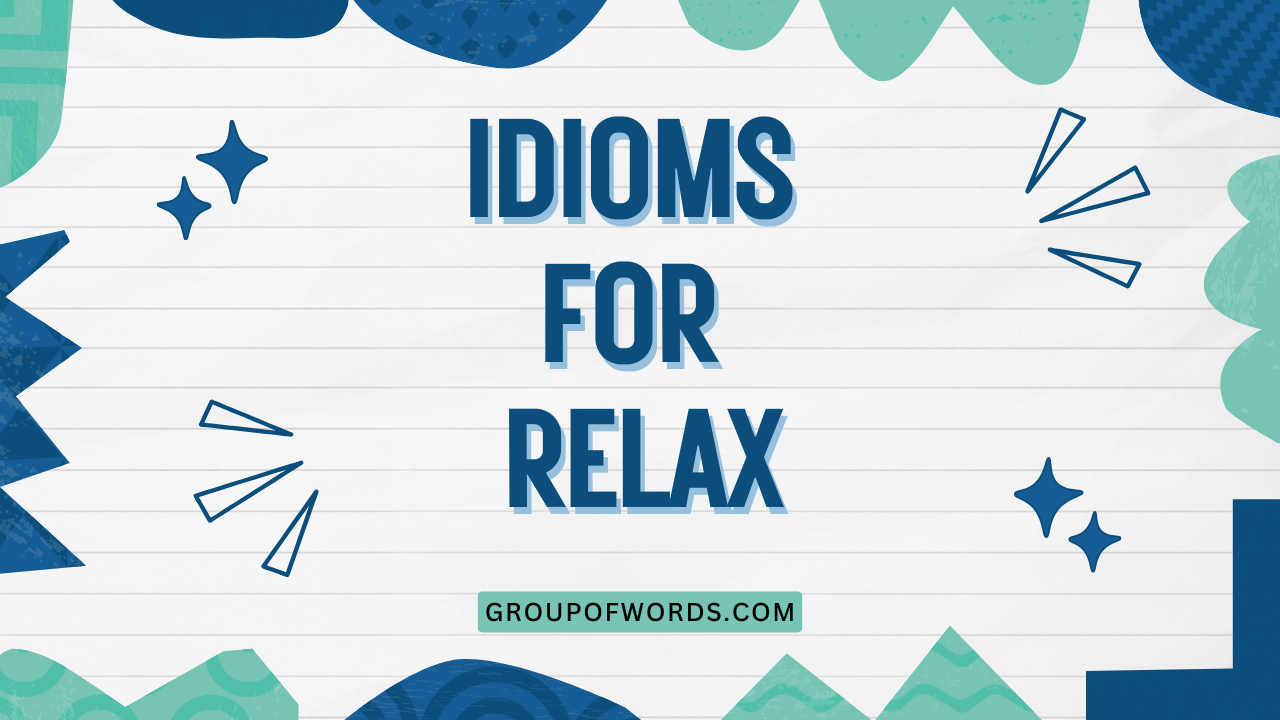Idioms for Relax: Mastering English Expressions of Ease
Idioms add color and vibrancy to the English language, allowing speakers to express nuanced meanings in a concise and engaging way. When it comes to describing the act of relaxing, English offers a rich array of idioms that go beyond simple terms like “rest” or “unwind.” Understanding these idioms not only enhances your comprehension of spoken and written English but also enables you to communicate more effectively and naturally.
This article delves into the world of idioms related to relaxation, providing definitions, examples, usage rules, and practice exercises to help you master these essential expressions. Whether you’re an English language learner or a native speaker looking to expand your vocabulary, this guide will equip you with the tools to discuss relaxation with confidence and flair.
Table of Contents
- Definition of Idioms for Relax
- Structural Breakdown of Relax Idioms
- Types and Categories of Relax Idioms
- Examples of Idioms for Relax
- Usage Rules for Relax Idioms
- Common Mistakes with Relax Idioms
- Practice Exercises
- Advanced Topics: Nuances and Regional Variations
- Frequently Asked Questions
- Conclusion
Definition of Idioms for Relax
An idiom is a phrase or expression whose meaning cannot be understood from the literal meanings of its individual words. Instead, it conveys a figurative or symbolic meaning known through common usage.
Idioms related to relaxation describe the act of becoming less tense, anxious, or stressed. These idioms often paint a picture of comfort, ease, and tranquility.
They are an integral part of everyday English conversation and writing, adding depth and color to communication.
Classification: Relax idioms can be classified based on the specific imagery they evoke, such as those related to physical comfort (e.g., “kick back”), mental ease (e.g., “take your mind off things”), or letting go of stress (e.g., “let your hair down”).
Function: These idioms function as verbs or verb phrases, describing the action of relaxing. They can also be used in descriptive contexts to portray a relaxed state or atmosphere.
Contexts: Relax idioms are used in a wide range of contexts, from casual conversations to formal writing. They are particularly common in informal settings, such as when talking with friends or family. However, some idioms are also appropriate for more formal settings, depending on the specific expression and the overall tone of the communication.
Structural Breakdown of Relax Idioms
Relax idioms, like all idioms, often defy simple grammatical analysis based on their individual words. Their structure is fixed, meaning the words cannot be easily changed or rearranged without altering the meaning or making the phrase nonsensical.
Here’s a breakdown of common structural elements:
- Verb + Preposition: Many relax idioms follow this structure. Examples include “kick back,” “chill out,” and “wind down.” The verb describes an action, and the preposition modifies its meaning to convey relaxation.
- Verb + Noun: Another common structure involves a verb followed by a noun. Examples include “take it easy” and “take a load off.” The verb indicates an action, and the noun provides a specific context related to relaxation.
- Phrasal Verbs: Some relax idioms are phrasal verbs, which consist of a verb and one or more particles (prepositions or adverbs). Examples include “zone out” and “space out.” The particle changes the meaning of the verb to express relaxation or detachment.
- Figurative Language: Many relax idioms rely on figurative language, such as metaphors or similes, to convey their meaning. For example, “let your hair down” uses the image of loosening tied-up hair to symbolize letting go of inhibitions and relaxing.
Types and Categories of Relax Idioms
Relax idioms can be categorized based on the specific aspect of relaxation they emphasize. Here are some common categories:
Physical Relaxation
These idioms focus on physical comfort and ease, often involving resting the body or engaging in leisurely activities.
Mental Relaxation
These idioms emphasize mental ease and detachment from stress or worries, often involving clearing the mind or engaging in enjoyable thoughts.
Emotional Relaxation
These idioms describe letting go of emotional tension and inhibitions, often involving expressing oneself freely or engaging in social activities.
Temporary Escape
These idioms suggest a brief departure from reality or responsibilities, often involving daydreaming, fantasizing, or engaging in escapist activities.
Examples of Idioms for Relax
The following tables provide examples of idioms for relax, categorized by the type of relaxation they describe. Each table includes the idiom, its meaning, and example sentences to illustrate its usage.
Table 1: Physical Relaxation Idioms
This table presents idioms that describe physical comfort and ease, highlighting how they are used in sentences.
| Idiom | Meaning | Example Sentence |
|---|---|---|
| Kick back | To relax and enjoy oneself, often in a comfortable position. | After a long day at work, I just want to kick back and watch a movie. |
| Take a load off | To sit down and rest, relieving physical strain. | Come in and take a load off; you look exhausted. |
| Put your feet up | To relax by resting one’s feet, often on a raised surface. | I’m going to put my feet up and read a book this afternoon. |
| Take it easy | To relax and avoid strenuous activity. | The doctor told him to take it easy after the surgery. |
| Lounge around | To relax in a lazy or comfortable way. | We spent the whole weekend lounging around the house. |
| Unwind | To relax and reduce stress after a period of exertion or tension. | A hot bath is a great way to unwind after a stressful day. |
| Chill out | To relax and calm down. | Just chill out and enjoy the music. |
| Take a break | To pause from work or activity to rest. | Let’s take a break and grab some coffee. |
| Hang loose | To relax and not worry. | Just hang loose and see what happens. |
| Rest and recharge | To relax and regain energy. | I need to rest and recharge before the next project. |
| Catch some Z’s | To sleep. | I’m going to catch some Z’s before the big game. |
| Sleep in | To sleep later than usual. | I plan to sleep in on Sunday morning. |
| Take a nap | To have a short sleep. | I might take a nap this afternoon. |
| Stretch out | To extend one’s limbs to relax the muscles. | I like to stretch out on the couch after a workout. |
| Loosen up | To become less tense. | Try to loosen up before your presentation. |
| Be at ease | To feel comfortable and relaxed. | I want everyone to be at ease during the meeting. |
| Laze around | To spend time relaxing and doing very little. | We lazed around by the pool all day. |
| Sprawl out | To sit or lie with your limbs spread out in a relaxed way. | He sprawled out on the beanbag chair. |
| Slack off | To reduce the amount of work one does. | It’s okay to slack off a little on the weekend. |
| Take five | To take a short break. | Let’s take five and then get back to work. |
| Idle away | To spend time doing nothing important. | We idled away the afternoon at the beach. |
| Take time out | To take a break from one’s activities. | I need to take some time out to clear my head. |
| Bum around | To spend time idly or aimlessly. | We bummed around the city for a few days. |
Table 2: Mental Relaxation Idioms
This table showcases idioms that focus on mental ease and detachment, providing example sentences to illustrate their usage in context.
| Idiom | Meaning | Example Sentence |
|---|---|---|
| Take your mind off things | To stop thinking about problems or worries. | Going for a walk helped me take my mind off things. |
| Clear your head | To refresh your mind by getting rid of worries or stress. | I went for a run to clear my head. |
| Switch off | To stop paying attention or thinking about something. | I switch off completely when I’m on vacation. |
| Zone out | To become mentally detached from one’s surroundings. | I sometimes zone out during long meetings. |
| Space out | Similar to “zone out,” to become mentally detached. | He tends to space out when he’s bored. |
| Let it go | To stop worrying about something. | You need to let it go and move on. |
| Go with the flow | To accept events as they happen without trying to control them. | Just go with the flow and enjoy the experience. |
| Not sweat it | To not worry about something. | Don’t sweat it; everything will be fine. |
| Keep a cool head | To remain calm in a stressful situation. | It’s important to keep a cool head in an emergency. |
| Take a chill pill | To calm down. | You need to take a chill pill and relax. |
| Get some headspace | To create mental space for oneself. | I need to get some headspace to think clearly. |
| Tune out | To stop paying attention to something. | I try to tune out the noise when I’m working. |
| Daydream | To indulge in pleasant thoughts or fantasies. | I often daydream about traveling the world. |
| Lost in thought | Engrossed in one’s thoughts. | He was lost in thought, staring out the window. |
| Meditate | To focus one’s mind for a period of time. | I meditate every morning to clear my mind. |
| Detach oneself | To separate oneself mentally or emotionally. | It’s important to detach oneself from work on the weekends. |
| Unplug | To disconnect from electronic devices. | I need to unplug for a while and enjoy nature. |
| Mellow out | To become more relaxed and calm. | He mellowed out after starting yoga. |
| Let your mind wander | To allow one’s thoughts to drift aimlessly. | I like to let my mind wander when I’m walking in the park. |
| Escape the grind | To get away from the daily routine. | We need to escape the grind and go on vacation. |
| Find peace of mind | To achieve a state of mental calmness. | Yoga helps me find peace of mind. |
| Recharge your batteries | To regain energy and enthusiasm. | A weekend getaway can recharge your batteries. |
| Get away from it all | To escape from one’s daily problems. | I want to get away from it all and relax on a beach. |
Table 3: Emotional Relaxation Idioms
This table provides examples of idioms that describe letting go of emotional tension, along with example sentences to show their usage.
| Idiom | Meaning | Example Sentence |
|---|---|---|
| Let your hair down | To relax and enjoy oneself in a free and uninhibited manner. | It’s Friday night; let your hair down and have some fun! |
| Be yourself | To act naturally and authentically. | Just be yourself and don’t worry about what others think. |
| Get something off your chest | To express something that has been bothering you. | I need to get something off my chest; it’s been weighing me down. |
| Open up | To share your feelings or thoughts with someone. | It’s good to open up to someone you trust. |
| Lighten up | To become less serious or tense. | Lighten up; it’s not the end of the world. |
| Cheer up | To become happier. | Cheer up; things will get better. |
| Shake it off | To dismiss or forget about something negative. | Just shake it off and move on. |
| Get over it | To recover from a disappointment or setback. | You need to get over it and focus on the future. |
| Roll with the punches | To adapt to difficult situations. | You have to roll with the punches in this business. |
| Keep your chin up | To remain positive in a difficult situation. | Keep your chin up; things will eventually improve. |
| Laugh it off | To dismiss something with laughter. | We laughed it off and moved on. |
| Find the silver lining | To find something positive in a negative situation. | We need to find the silver lining in this setback. |
| Count your blessings | To be grateful for the good things in your life. | Count your blessings and appreciate what you have. |
| Take heart | To be encouraged. | Take heart; you’re not alone. |
| Vent | To express one’s feelings freely. | It’s good to vent to a friend when you’re stressed. |
| Blow off steam | To release pent-up energy or emotions. | I go to the gym to blow off steam. |
| Get it out of your system | To express or do something that you have been wanting to do. | I needed to get it out of my system, so I told him how I felt. |
| Release tension | To alleviate stress or anxiety. | Yoga helps me release tension in my body. |
| Unburden yourself | To relieve oneself of worries or problems. | It helps to unburden yourself by talking to someone. |
| Let off steam | To release one’s emotions or energy. | I went for a run to let off steam. |
| Air your grievances | To express complaints or concerns. | The meeting was an opportunity to air our grievances. |
| Clear the air | To resolve a conflict or misunderstanding. | We need to clear the air and talk things out. |
| Make peace with | To accept something difficult or unpleasant. | I’ve learned to make peace with my past. |
Table 4: Temporary Escape Idioms
This table presents idioms that describe a brief departure from reality, providing example sentences to illustrate their usage.
| Idiom | Meaning | Example Sentence |
|---|---|---|
| Get lost in a book | To become completely engrossed in reading. | I love to get lost in a book on a rainy day. |
| Escape into a movie | To use watching a movie as a form of escapism. | Sometimes I just want to escape into a movie and forget about everything. |
| Live in a fantasy world | To spend time imagining unrealistic scenarios. | He tends to live in a fantasy world when he’s bored. |
| Dream away | To spend time daydreaming. | I could dream away the whole afternoon, watching the clouds. |
| Build castles in the sky | To make plans that are unlikely to happen. | He’s always building castles in the sky, but he never takes action. |
| Take a mental vacation | To imagine oneself on a vacation. | When I’m stressed, I take a mental vacation to the beach. |
| Check out | To temporarily withdraw from reality. | I just need to check out for a while and relax. |
| Tune out the world | To ignore what is happening around you. | I like to tune out the world and listen to music. |
| Float away | To drift into a state of relaxation. | I feel like I could float away when I’m listening to calming music. |
| Travel in your mind | To imagine traveling to a different place. | When I can’t travel physically, I travel in my mind. |
| Lose oneself in music | To become completely absorbed in listening to music. | I love to lose myself in music after a long day. |
| Drown out the noise | To block out distractions. | I try to drown out the noise with headphones when I’m working. |
| Hide away | To seclude oneself. | Sometimes I just want to hide away and be alone. |
| Get off the grid | To become unreachable or disconnected. | I’d love to get off the grid for a week and just relax. |
| Disappear for a while | To vanish temporarily. | I need to disappear for a while and recharge. |
| Visit dreamland | To go to sleep and dream. | Time to visit dreamland and get some rest. |
| Drift off to sleep | To gradually fall asleep. | I drifted off to sleep while reading a book. |
| Escape the everyday | To break free from daily routines. | We need to escape the everyday and do something exciting. |
| Withdraw from the world | To isolate oneself from society. | Sometimes I just want to withdraw from the world and be alone. |
| Transport yourself | To imagine being in a different place or time. | Music can transport yourself to another world. |
| Create a sanctuary | To establish a peaceful retreat. | I’ve created a sanctuary in my backyard where I can relax. |
| Find refuge | To seek protection or comfort. | I find refuge in nature when I’m feeling stressed. |
| Take a sabbatical | To take a break from work for study or travel. | I’m planning to take a sabbatical next year. |
Usage Rules for Relax Idioms
Using relax idioms correctly requires understanding their specific meanings and contexts. Here are some general rules to follow:
- Context Matters: Consider the setting and audience when using idioms. Some idioms are more appropriate for informal conversations, while others can be used in more formal contexts.
- Figurative Meaning: Remember that idioms have a figurative meaning that differs from the literal meaning of the words. Ensure that you understand the intended meaning before using an idiom.
- Fixed Structure: Idioms have a fixed structure, so avoid changing the words or rearranging them. Altering the structure can change the meaning or make the idiom nonsensical.
- Verb Tense: Adjust the verb tense of the idiom to match the intended time frame. For example, “He kicked back” (past tense) vs. “He is kicking back” (present continuous tense).
- Subject-Verb Agreement: Ensure that the subject and verb in the idiom agree in number. For example, “I take it easy” vs. “He takes it easy.”
Common Mistakes with Relax Idioms
Learners often make mistakes when using relax idioms due to a lack of understanding of their figurative meanings or fixed structures. Here are some common errors and corrections:
| Incorrect | Correct | Explanation |
|---|---|---|
| I will take a load from my shoulders. | I will take a load off. | “Take a load off” is the correct idiom, not “take a load from my shoulders.” |
| He is chilling himself. | He is chilling out. | “Chill out” is the correct phrasal verb, not “chilling himself.” |
| Let down your hair. | Let your hair down. | The possessive pronoun “your” is necessary in the idiom “let your hair down.” |
| Take easy. | Take it easy. | The pronoun “it” is required in the idiom “take it easy.” |
| I need to clear my head from things. | I need to clear my head. | The idiom is simply “clear my head,” without adding “from things.” |
Practice Exercises
Test your understanding of relax idioms with the following exercises. Choose the correct idiom to complete each sentence.
Exercise 1: Multiple Choice
Choose the best idiom to complete each sentence.
| Question | Options | Answer |
|---|---|---|
| After a stressful week, I just want to _________ and watch a movie. | a) take a break b) kick back c) let my hair down | b) kick back |
| The doctor advised him to _________ after his illness. | a) take it easy b) let it go c) blow off steam | a) take it easy |
| She needed to _________ after the argument with her friend. | a) take a chill pill b) clear her head c) switch off | b) clear her head |
| It’s Friday night; let’s _________ and have some fun! | a) take a load off b) let our hair down c) zone out | b) let our hair down |
| I like to _________ in a good book on a rainy afternoon. | a) get lost b) space out c) unwind | a) get lost |
| Sometimes, I just need to _________ and forget about everything. | a) escape into a movie b) take my mind off things c) go with the flow | a) escape into a movie |
| After a long day, I just want to _________ and relax. | a) switch off b) take five c) hang loose | a) switch off |
| Don’t _________ over the small stuff; it’s not worth it. | a) sweat it b) take heart c) keep a cool head | a) sweat it |
| We spent the weekend _________ by the pool. | a) lounging around b) resting and recharging c) lazing around | a) lounging around |
| I need to _________ before starting the next project. | a) rest and recharge b) take a nap c) stretch out | a) rest and recharge |
Exercise 2: Fill in the Blanks
Complete the sentences using the correct form of the idioms provided below.
Idioms: chill out, get something off your chest, go with the flow, put your feet up, blow off steam
| Question | Answer |
|---|---|
| After a tough day, I just want to _________ and relax. | put my feet up |
| It’s important to _________ and not worry about things you can’t control. | go with the flow |
| Sometimes, you just need to _________ to release pent-up energy. | blow off steam |
| If something is bothering you, you should _________. | get something off your chest |
| Just _________ and enjoy the music. | chill out |
Advanced Topics: Nuances and Regional Variations
Beyond the basic definitions and usage rules, there are more complex aspects to understanding relax idioms. These include nuances in meaning, regional variations, and the evolution of idioms over time.
- Nuances: Some idioms have subtle differences in meaning depending on the context. For example, “take it easy” can mean “relax” or “goodbye,” depending on the situation.
- Regional Variations: Certain idioms may be more common in specific regions or dialects. For example, an idiom used in the Southern United States may not be as well-known in the United Kingdom.
- Evolution: Idioms can evolve over time, with new idioms emerging and old idioms falling out of use. Staying up-to-date with current language trends is essential for effective communication.
Frequently Asked Questions
Here are some frequently asked questions about relax idioms:
- What is the difference between an idiom and a literal expression?
An idiom is a phrase whose meaning is different from the literal meanings of its individual words. A literal expression, on the other hand, means exactly what it says.
- Why are idioms important in English?
Idioms add color and vibrancy to the English language. They allow speakers to express nuanced meanings in a concise and engaging way. Understanding idioms is essential for comprehending spoken and written English and for communicating effectively.
- How can I learn new idioms?
You can learn new idioms by reading books, watching movies and TV shows, listening to podcasts, and paying attention to how native speakers use language. You can also use online resources and idiom dictionaries to expand your vocabulary.
- Is it okay to use idioms in formal writing?
It depends on the specific idiom and the overall tone of the writing. Some idioms are appropriate for formal settings, while others are more suitable for informal contexts. Use your judgment and consider your audience.
- What should I do if I don’t understand an idiom?
If you don’t understand an idiom, ask someone to explain it to you. You can also look it up in an idiom dictionary or online resource. Pay attention to the context in which the idiom is used to help you understand its meaning.
- Are idioms the same in all English-speaking countries?
No, idioms can vary between different English-speaking countries and regions. Some idioms may be more common in certain areas than others. Be aware of regional variations when learning and using idioms.
- How can I avoid misusing idioms?
To avoid misusing idioms, make sure you understand their specific meanings and contexts. Pay attention to the fixed structure of idioms and avoid changing the words or rearranging them. Practice using idioms in conversation and writing to improve your fluency.
- Can I create my own idioms?
While it’s generally best to use established idioms, language is constantly evolving. However, for an idiom to become widely accepted, it needs to be adopted and used by many people over time. Creating a new idiom and expecting others to understand it immediately is unlikely to be successful.
Conclusion
Mastering idioms for relax is a valuable skill for anyone learning or using the English language. These expressions add depth, color, and authenticity to your communication, allowing you to express nuanced meanings in a concise and engaging way.
By understanding the definitions, structures, and usage rules of relax idioms, you can enhance your comprehension of spoken and written English and communicate more effectively in a variety of contexts. Remember to practice using these idioms in conversation and writing to improve your fluency and confidence.
With dedication and practice, you can master these essential expressions and elevate your English language skills to the next level.






